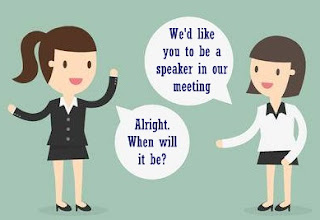H
adi is sitting and drinking a cup of coffee when he sees Margaret.| Hadi: | Hello, Margaret! |
| Margaret: | Oh, hello, Hadi. |
| Hadi: | Won't you sit down here? |
| Margaret: | Certainly. What are you doing? |
| Hadi: | Just drinking coffee and thinking. |
| Margaret: | Well, now you can drink coffee and talk! I want to be told all the news! |
| Hadi: | News! What news! |
| Margaret: | About Jim and Betty's friends, the Fosters - Tom and Nancy. They've just come back from Indonesia, haven't they? |
| Hadi: | Oh, yes, they arrived home last week. I was invited to Jim and Betty's place a few days ago, and Tom and Nancy were there too. |
| Margaret: | And did they tell you all about their trip? What did they do? Where did they go?What interested them the most? Did they enjoy themselves? |
| Hadi: | Yes, I think they enjoyed their holiday very much. They went to Jakarta first - by plane from Sydney. They have some friends in Jakarta, and so they were invited to a lot of places, and they were taken on several visits. |
| Margaret: | Lucky people! |
| Hadi: | After they'd been in Jakarta for a few days, a visit to Bandung was arranged for them. They were taken there by car. They were delighted by the scenery in Bandung. |
| Margaret: | Yes, it must be a beautiful place. |
| Hadi: | Ah, you'll go there one day, Margaret! |
| Margaret: | Mm! Did Nancy and Tom speak Indonesian while they were there? |
| Hadi: | A little. They knew only a few words of Indonesian - but they practiced them whenever possible! They met some Indonesian people who could speak English to them. |
| Margaret: | Really? |
| Hadi: | Yes, English is spoken by quite a lot of people in Indonesia now! One day Nancy and Tom were invited to a meeting of a Youth Club. They were asked to give a speech. |
| Margaret: | In English? |
| Hadi: | Yes. And after the speech had been given, they were asked a lot of questions about Australia. They found it very interesting. |
| Margaret: | H'm. |
| Hadi: | Another day, they went to Borobudur. |
| Margaret: | Where? |
| Hadi: | Borobudur. Haven't you heard of it? |
| Margaret: | I'm not sure, Hadi. Where is it? |
| Hadi: | It's in Central Java. It's an old Buddhist temple. It was built - oh, a long time ago. |
| Margaret: | How long ago? |
| Hadi: | I don't know, Margaret - I'm not a history student! |
| Margaret: | Neither am I. |
| Hadi: | I don't think the date is known exactly, but it must have been built - oh, between the eighth and ninth centuries. It was designed very beautifully. |
| Margaret: | And it's a tourist attraction, is it? |
| Hadi: | Yes. If you come to the party next week, you'll be shown some pictures of it. Tom and Nancy are bringing some photos that were taken in Indonesia. |
| Margaret: | Good! I love being shown photos! What else did Tom and Nancy do? |
| Hadi: | Well, they didn't have much time to go to a lot of places - it was only a very short holiday - but they had a quick visit to Bali. Then they came back to Jakarta, and caught the plane home to Sydney. |
| Margaret: | And they were met at the airport by Betty and Jim. |
| Hadi: | Yes. And when Betty and Jim heard all about their holiday, they decided that they must go to Indonesia for a holiday themselves! |
Exercise
Answer the following questions.
- Where does the above conversation probably take place?
- Who are they talking about?
- Where have the Fosters been?
- When did they arrive?
- What places did they visit during their trip?
- How long did they stay in Jakarta?
- Where did they go after visiting Jakarta?
- Did Nancy and Tom speak Indonesian language during their trip?
- where did Nancy and Tom give a speech?
- What happened after the speech?
- Does Margaret know much about Borobudur temple?
- What does Hadi know about Borobudur?
- Where will Margaret be shown the photos of the trip?
- Was it a long holiday, or was it a short one?
- What did Betty and Jim decide to do after hearing about the Fosters' holiday?












